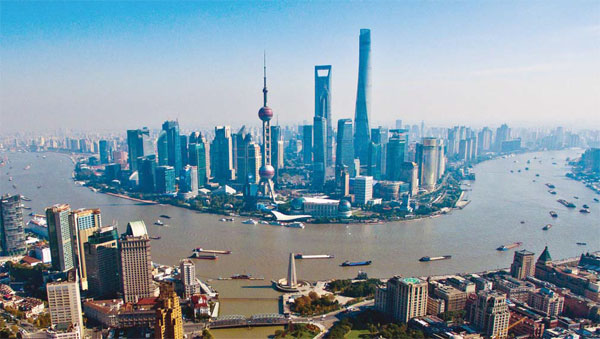More than just a financial hub
Authorities are hoping to achieve a holistic development of Lujiazui through an infusion of arts and culture
The Shanghai municipal government recently announced that it would solicit public opinion regarding its master plan to develop a global city of excellence that is innovative, humanistic and eco-friendly.
"Shanghai is aiming to become a global city of excellence by 2040, one that is an economic, finance, trade, shipping and scientific innovation center, as well as a cultural metropolis," said Zhuang Shaoqin, director of the city's planning, land and resources administration.
|
Lujiazui business district in Shanghai is striving to turn itself into a a rich cultural atmosphere for residents and workers. Provided to China Daily |
Zhuang noted that the development of the city's cultural aspects would be pivotal to Shanghai's future as China's main financial hub.
The authorities for Shanghai's Lujiazui area, one of the most bustling trade and business locations with the highest concentration of financial institutions, shares the same sentiment with regard to cultural development.
"During the period of the 13th Five-Year Plan (2016-2020), our goal is to build Lujiazui into the world's leading financial hub. Other financial centers around the world, such as New York, Tokyo and London, are not only gathering places for financial trade activities but also hubs for culture and fashion. Lujiazui is striving to turn itself into a financial hub with high cultural quality and tastes," said Wang Hua, head of Lujiazui Financial City Authority.
Home to more than 5,000 emerging financial institutions and companies, Lujiazui has about 470,000 white-collar workers concentrated in an area of 31.78 square kilometers. The need to create a rich cultural atmosphere for the residents and workers of this zone has long weighed on the minds of officials.
In March 2015, the authorities from Lujiazui issued a guideline that aims to improve the cultural environment in Lujiazui. The three-year plan covers various aspects, such as introducing key projects, developing the cultural industry and organizing a series of cultural activities and events.
After more than a year of development, a host of activities have been introduced to the financial district, including concerts, lectures by professional arts groups during lunch hours, an outdoor arts festival and poetry parties. There was even a singing contest called Voice of Lujiazui, a spin-off of the massively popular The Voice of China reality singing contest, that pitted white-collar workers in Lujiazui against one another.
The district administrators have also worked with more institutions, such as the Shanghai Symphony Orchestra and the Shanghai Light Music Orchestra, to stage performances in office buildings.
In the first half of this year, more than 150 cultural activities have been carried out in office buildings in the financial district, of which more than 30 were cultural and arts performances. The activities seem to have been well received, with an increasing number of white-collar workers getting involved in the festivities.
"In the past, I would only spend money to buy tickets to a pop concert. Nowadays I actually find myself listening to classical music as well. Such is the influence of Lujiazui's cultural development," said Tao Liang, an employee at Bank of Communications who participated in the first edition of The Voice of Lujiazui, which was held earlier this year.
In addition, cultural industry development projects, such as an international arts products trade center, a cultural industry incubation base and the establishment of a public arts environment, have also been undertaken to enliven the cultural atmosphere in Lujiazui.
Kuai Dashen, a researcher at the Shanghai Academy of Social Sciences, said,"A city cannot just have a single function. Besides being a financial hub, Lujiazui must also become an ambassador of Shanghai's rich culture."
Kuai, who is also a consultant in the professional committee for development of the national public culture service system, noted that the intent behind creating cultural activities and events in the district is not for entertainment or profit-making. Rather, it is to establish a platform for the cultivation of Lujiazui's cultural characteristics and spirit.
"From a historical development perspective, trade and financial activities are indeed the core of a central business district such as Lujiazui. However, the presence of rich and meaningful cultural experiences can help to better present and amplify the identity of a place. In this regard, the development of the cultural characteristics is a necessary path that Lujiazui has to take," said Xue Yingping, an official from Lujiazui.
wanghongyi@chinadaily.com.cn



















